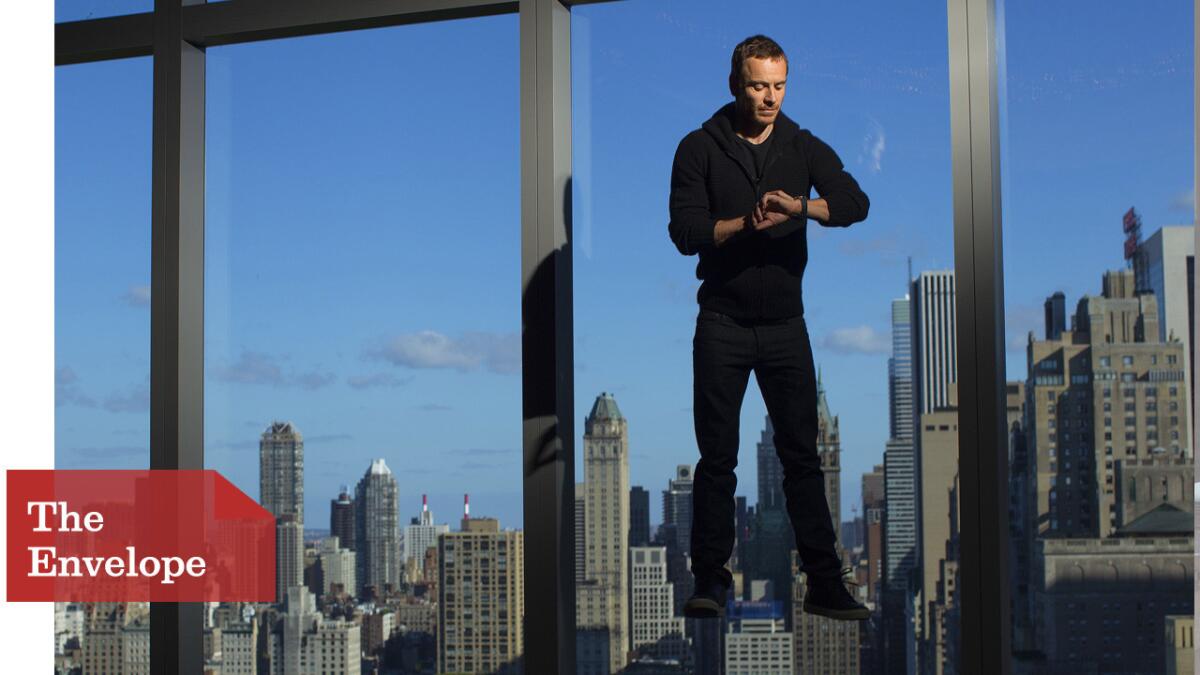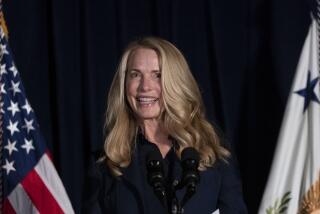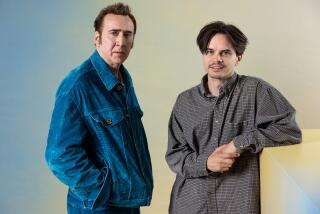As ‘Steve Jobs,’ Michael Fassbender learned it’s all about control

- Share via
NEW YORK CITY — Every time Michael Fassbender talks about his iPhone — and, since he played Apple co-founder Steve Jobs in the audacious biopic “Steve Jobs,” the subject comes up now and then these days — the 38-year-old actor reflexively pats the front pocket of his dark blue jeans just to make sure the device is still there.
“I’ve lost so many of them,” Fassbender says, laughing and, with a wave of his hand, adding, “they come and they go.”
It’s autumn in New York and we’re speaking the day after “Jobs’” gala screening at the New York Film Festival. Fassbender, sporting a few days’ worth of beard and wearing a T-shirt and cable-knit pullover, looks suitably disheveled from the revelry of the previous evening. He and director Danny Boyle, whose beaming enthusiasm could work wonders on the most severely sleep-deprived, have reconvened to talk about making “Jobs,” a movie that opened to rave reviews and intense media interest but scant box-office returns. It had all the makings of an event film, only, for many, the invitation got lost somewhere along the way.
SIGN UP for the free Indie Focus movies newsletter >>
We chat a little about Jobs’ creations. Boyle’s daughter gave him an iPod years ago as a gift, inscription and everything, and it’s loaded with songs from the Clash, including the filmmaker’s favorite, “(White Man) In Hammersmith Palais.” (In the interest of equal time: Fassbender chooses Marvin Gaye’s “Sexual Healing.”) That thread leads to Bob Dylan, an artist Jobs worshiped and whose music is prominently featured in the film.
“Are they expensive, the Dylan songs?” Fassbender asks.
“He was wonderful,” Boyle answers. “He’s repaying some of Jobs’ faith in him. He gave us the songs really cheap. He helped a lot.” He pauses and frowns, turning dark. “And we’ve not had the help of a lot of people.”
Indeed. Critics loved the film’s three-act dissection of the Apple co-founder’s rise and ruthlessness and the ways his genius could, simultaneously, inspire and alienate those closest to him. (The Los Angeles Film Critics Assn. recently gave Fassbender its lead actor honor.) But some of Jobs’ intimates — notably, his wife, Laurene Powell Jobs, and many prominent Silicon Valley figures — attacked the movie, calling it fictional and defamatory.
“Apple is a huge corporation,” Boyle says of the criticism, “and they like to have control of stuff. That’s why this movie is important: Everybody’s answerable, especially a figure like this.”
But answerable to what exactly? Divided into three chapters, each taking place before a product launch, Aaron Sorkin’s screenplay takes Walter Isaacson’s Jobs biography and paints its title character as a brooding, complicated control freak, brilliant in understanding consumers but clueless at comprehending those close to him.
Fassbender says the real clue to perceiving the film’s vision of Jobs comes in a scene in which Apple Chief Executive John Sculley (played by Jeff Daniels), who in the film functions as a father figure to Jobs, confronts him over his lingering hurt about being adopted. “It’s not like the baby is born, the parents look and say, ‘No, we’re not interested in this one,’” Sculley tells him. “Someone did choose you.”
“It’s having no control,” Jobs responds. “You find out you were out of the loop when the most crucial events in your life were set in motion. As long as you have control, I don’t understand people who give it up.”
Says Fassbender: “That line about control, that means everything, especially because he’s saying it to John Sculley, who is this paternal figure. You want to know about this man who dragged the world of technology into his vision? It’s right there.”
But in the next breath, Fassbender freely admits that he has no idea who Jobs really was and that whatever impressions he has of the man came through Sorkin’s script as filtered through Isaacson’s book.
“And I’ve met enough people now, having seen them through the prism of the media and then actually meeting them, thinking, ‘Wow. That’s a different person,’” Fassbender says. “You take it all with a grain of salt.”
That bone-deep skepticism extends to serious misgivings about technology. And Boyle, who labels Apple’s ideology of “product line as philosophy” as dangerous and calls Dave Eggers’ 2013 Orwellian tech novel “The Circle” prophetic, is right there with him.
“We don’t have any problem being cynical about banks and oil and pharmaceutical companies, but somehow everything Google and Apple does is completely benign,” Boyle says. “It bears watching.”
Boyle points to the movie’s first segment, the anxiety-ridden unveiling of the first-ever Macintosh in 1984, as ground zero for this insidious consumerism. We see Jobs pointing to the little computer, telling colleagues that it resembles a friendly face with the disk slot being its goofy grin. It’s a classic example of Jobs’ determination to convince people to see things as he sees them (Andy Hertzfeld, a member of the original Mac design team, called it Jobs’ “reality distortion field”), even if, as Boyle notes, that disk slot actually bears little resemblance to a whimsical smile.
“He wanted people to see the Macintosh as a toy because, before this, computers were perfunctory and gray and scary,” Boyle says. “But if it’s a toy, then you can develop an emotional relationship with it.”
“A friend of mine put stickers on his computer that say, ‘This is a tool. It’s not a relationship,’” Fassbender says. He laughs. “You could say he doesn’t buy into that vision.”
Fassbender doesn’t either. Going out to meals, he has a rule: no phones. If somebody at the table brings one out, the actor will politely ask them to put it away. And when he’s on vacation or working, he turns his devices off. And since he’s almost always working (“Jobs” is his third movie this year; he’ll likely have at least four in 2016), people know not to expect an immediate reply.
“The levels of communication now, whether it’s texting, answering the phone, emailing, twittering … where does one find the time?” Fassbender asks. “It’s an annoyance. Bing! Bing! Bing! We’d all be in a better place mentally, I think, if we just turned them off and looked at each other.”
For the record: He didn’t check his phone once in the hour we spent together.
More to Read
From the Oscars to the Emmys.
Get the Envelope newsletter for exclusive awards season coverage, behind-the-scenes stories from the Envelope podcast and columnist Glenn Whipp’s must-read analysis.
You may occasionally receive promotional content from the Los Angeles Times.







